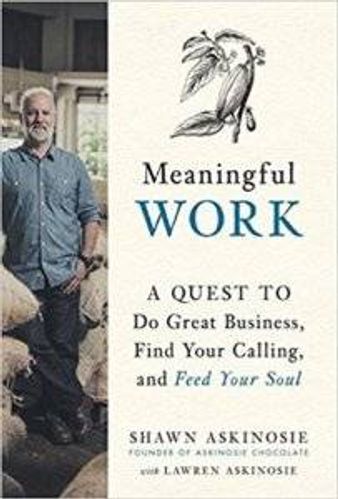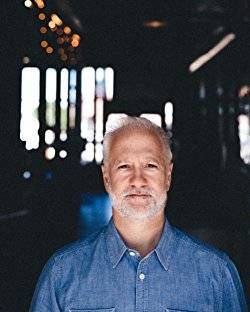How to Find Meaningful Work to Feed Your Soul
Heartfelt advice from a criminal defense lawyer turned chocolatier
For almost 20 years, Shawn Askinosie was a top criminal defense lawyer, specializing in serious felony cases like murder, robbery and drugs. Some of those cases involved the prospect of the death penalty or life in prison. “The stakes were very high. I loved it. It was my calling at the time,” Askinosie told me. Until it wasn’t.


In 2005, Askinosie chucked his legal career to pursue his calling, starting a chocolate business. Today, Askinosie, 56, runs Askinosie Chocolate, a small batch bean-to-bar chocolate manufacturer, with his daughter Lawren in Springfield, Mo. Forbes has called it one of the 25 Best Small Companies in America and the 16-person small business has a big heart, sharing profits with its farmer partners and feeding 2,600 students in Tanzania and the Philippines through its A Product of Change program.
The Askinosies recently wrote a book to help others pursue their calling — Meaningful Work: A Quest to Do Great Business, Find Your Calling and Feed Your Soul. It’s part how-to for prospective entrepreneurs and part how-to-be for everyone.
I spoke with spiritual entrepreneur Shawn Askinosie, who is also a Family Brother at Assumption Abbey (a Trappist monastery) and asked him to share his story plus his advice for others who’d like to find more meaning in their lives through work (hint: he says joining a nonprofit board is not the answer):
Next Avenue: Why did you write ‘Meaningful Work?’
Shawn Askinosie: I decided I wanted to write it because I felt like it was the book I needed when I was yearning to do something else and wished I had this advice.
What do you hope readers can get from it?
My hope is that they can begin to let some idea in the book resonate with them and put it into action. It could be their interior lives — things like meditating or praying —and also their exterior lives — what do they do physically.
How did you know it was time to leave the law for the world of chocolate? And how can others know when it’s time to stop what they’re doing and feed their soul?

We can sense this in our bodies; our bodies give us messages. Not just ‘I’m getting old,’ but maybe ‘I shouldn’t be doing this; it doesn’t feel good anymore.’
It started for me in my early 40s. I began a five-year search of what’s next for me. That was quite a process. It involved a lot of prayer — the same prayer every day, which was ‘Please God, give me something else to do.’
I believe we are encoded beings, driving toward some kind of meaning. It doesn’t matter how old you are. I know some 88-year-olds who live lives of meaning and some who don’t. And I know some 20-year-olds who live lives of meaning and some who don’t.
What about people in their 50s and 60s?
As we get older, we have greater opportunities to find meaning in life if we’re willing to look for it. The main reason it’s true is we have an understanding of what it means to have a broken heart, otherwise known as sorrow. We can examine that and then begin to figure out what’s next.
Why does experiencing sorrow matter?
One of the central quotes in my book is from Kahlil Gibran [author of ‘The Prophet’], and I’m paraphrasing: Our greatest joy is our sorrow unmasked.
In my book, I talk about the sorrowful, joyful experiences in my life. My dad died of lung cancer when I was 14. It was just terrible; he was my hero and I was with him at the time and wasn’t expecting it. That was the most sad and sorrowful I’ve been in my whole life. Seventeen years ago, I founded a grief center for children in southwest Missouri — the Lost & Found Grief Center. When I work with teens who have a parent who died, can you imagine the joy I feel when I leave that group?
The writer Steven Jenkinson [Die Wise: A Manifesto for Sanity and Soul’] says we shouldn’t try to fix our broken heart. The idea is to recognize and understand how brokenheartedness leads to meaningful days and lives.
How can people find meaningful work in their 50s and 60s?
Employees can go to work and think: ‘How do I find meaning in my work?’ Maybe you don’t think you have the power to change the whole company. In that case, it’s important to remember the story of when JFK was visiting NASA and saw a gentleman sweeping the floor. Kennedy asks: ‘What do you do?’ And the man looks at the president and says: ‘I’m helping to send a man to the moon.’ He was a janitor, but his attitude was one of participating in the mission of the organization.
For those who think ‘I don’t have power in my organization,’ ask yourself: ‘What power do I have?’ You have great power to reformulate how you view your job through one word: Dignity. In work, that doesn’t come from the title of your job, but from the attitude you have toward your work.
And how can someone who wants to become an entrepreneur or change fields find meaningful work?
If you’re working now and thinking ‘I’m going to leave my job and start X,’ I would ask that person: 'Why do you want to do this? What is your purpose? Do you hate your job or do you love this thing that you must do?'
Explore what is meaningful to you: What does a day look like that is a good day? What was a day when you felt you contributed to someone else’s well-being or someone else contributed to your well-being? Before you show me your business plan, I encourage you to stop and reflect on what is meaningful to you.
And then once someone is ready to make a business plan?
Do the hard work and put together a forecast for your business. This is where the rubber meets the road. Is the thing you want to do sound financially? Can you feed your family and put your kids through college and live the life you want to live? Understand how the business will impact you financially.
Also, ask yourself: ‘What is my level of risk tolerance and how will starting this business affect other people in my life?’
What if someone is a small business owner but is nervous about starting something new there that will let him or her pursue a calling through the business?
I say: ‘Look. I understand. I’ve been there. Take one step toward your dream of engaging employees and helping out in the community and you will find these doors in the universe will open in ways you could never imagine. The universe conspires to help us serve other people.
In the book, you talk about discovering the 'internal space where you can ponder your next steps with clarity.' What do you mean by that?
I would say that if you’re like I am — a very Type A person who’s constantly doing, doing, doing — if you don’t discover the internal space where you can ponder your next steps with clrity, you will never find what you’re looking for. It can take along time; for me, it took about five years.
Is serving on a nonprofit board a way to find meaningful work and a calling?
A lot of people think they can serve on a board and that that's enough. Nope. That will not work. Many people in their 50s and 60s are on boards and find that meaningful, but it’s not what I’m talking about. I believe it’s a more hands-on approach, of rolling up your sleeves and being with people who need you. It can be the most rewarding experience of your life.
You’re a big fan of going on a retreat to help find meaning in life. Can you talk about that?
We think of a retreat as a retreat from something, like the enemy facing me. But I mean it as a way to separate ourselves from our daily life. It’s a time of rest, but also a time of solitude. Many people are uncomfortable with solitude, especially these days with Instagram and Facebook. They find it even painful.
But I encourage people to think about ways they can retreat from everyday life and find a place of rest and solitude. We have a lot of thoughts hanging around in our minds. If we can let them settle down and make peace with them, that will give us resilience in our daily lives once we leave the retreat.
You can practice solitude whether you have an hour or a week. It helps us live longer, happier lives.


